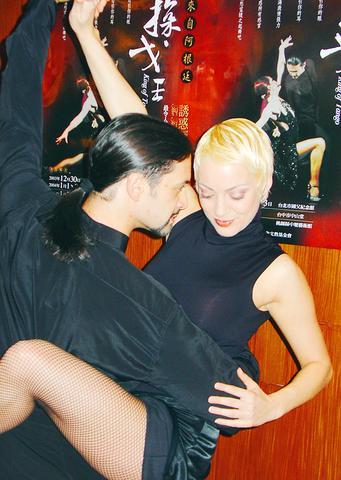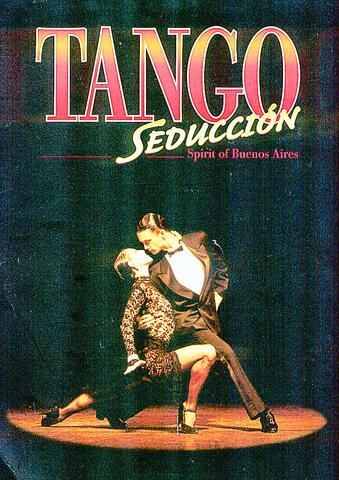Following two popular tango shows in Taipei in previous years -- Tango Passion in 1997, Forever Tango last year, there is another heavy-weight Tango troupe from Argentina coming to Taiwan -- the King of Tango, led by renowned dancer Gustavo Russo.
The troupe will play eight consecutive shows in Taiwan's four cities.
Apart from being one of the best Tango troupes in the world, which has sold out shows in London, Vienna, Madrid, Brussels and Berlin, there is another attraction to King of Tango. The repertoire, titled The Tango Seduction, will largely use the music of Nuevo Tango master Astor Piazzolla. Taiwan and Hong Kong have recently gone through a craze for Piazzolla's music and it is expected that the show will attract Piazzolla music fans.

PHOTO: COURTESY OF NEW ASPECT FOUNDATION
Seven musicians, including the accordianist and one singer will accompany 13 dancers to present a show with rich flavors and elegant body movements.
What is tango, exactly? For star dancer Gustavo Russo, the point is to express the entanglement and tension of love.
Those who went to the performance of Tango Passion in 1992 will find Gustavo Russo a familiar face. He was the young first-seat dancer in the show that played 11 years ago in Taipei. Russo is the winner of the Estelares Del Mar (Star of the Sea), a top tango competition in Argentina for seven consecutive years.

He also won the title of Precio Del Argentina, that was presented by the Buenos Aires Academy.
After a string of successful world tours and a short period performing in the Broadway productions, Russo recruited top dancers from various tango troupes in Argentine and formed his own "King of Tango" troupe in 2001.
The show follows a love story that takes place in a pub in Buenos Aires' harbor area. According to Russo it is a story about jealousy and passion.

Act one of "The Tango Seduction" covers the origin and the history of tango styles. The stage, decorated as an old fashioned bar by the harbor, has the dancers playing roles from different social classes, all expressing their sentiment through dancing. Here, tango is a direct, collective expression of the emotions of European
immigrants.
Act two of the show is the "Tango Nuevo." This newly styled tango has now turned into an art form, in terms of dance steps and music. On the stage there will be a giant mirror to create illusory images of the dancers. Piazzolla's music will harmonize with the more complicated steps of the seven pairs to produce a thrillingly rich image on stage.
Russo will be paired with Samanta Garcia, who has performed in Broadway productions such as Les Miserables, Cats and Miss Saigon.
The musical director of the troupe, Fernanado Marzan, also has an impressive background. He was the composer and music director for Madonna's Evita and one of his recent works is Bedita Buenos Aires, co-composed with Japanese musician Taro Hakase.

In the March 9 edition of the Taipei Times a piece by Ninon Godefroy ran with the headine “The quiet, gentle rhythm of Taiwan.” It started with the line “Taiwan is a small, humble place. There is no Eiffel Tower, no pyramids — no singular attraction that draws the world’s attention.” I laughed out loud at that. This was out of no disrespect for the author or the piece, which made some interesting analogies and good points about how both Din Tai Fung’s and Taiwan Semiconductor Manufacturing Co’s (TSMC, 台積電) meticulous attention to detail and quality are not quite up to

April 21 to April 27 Hsieh Er’s (謝娥) political fortunes were rising fast after she got out of jail and joined the Chinese Nationalist Party (KMT) in December 1945. Not only did she hold key positions in various committees, she was elected the only woman on the Taipei City Council and headed to Nanjing in 1946 as the sole Taiwanese female representative to the National Constituent Assembly. With the support of first lady Soong May-ling (宋美齡), she started the Taipei Women’s Association and Taiwan Provincial Women’s Association, where she

Chinese Nationalist Party (KMT) Chairman Eric Chu (朱立倫) hatched a bold plan to charge forward and seize the initiative when he held a protest in front of the Taipei City Prosecutors’ Office. Though risky, because illegal, its success would help tackle at least six problems facing both himself and the KMT. What he did not see coming was Taipei Mayor Chiang Wan-an (將萬安) tripping him up out of the gate. In spite of Chu being the most consequential and successful KMT chairman since the early 2010s — arguably saving the party from financial ruin and restoring its electoral viability —

It is one of the more remarkable facts of Taiwan history that it was never occupied or claimed by any of the numerous kingdoms of southern China — Han or otherwise — that lay just across the water from it. None of their brilliant ministers ever discovered that Taiwan was a “core interest” of the state whose annexation was “inevitable.” As Paul Kua notes in an excellent monograph laying out how the Portuguese gave Taiwan the name “Formosa,” the first Europeans to express an interest in occupying Taiwan were the Spanish. Tonio Andrade in his seminal work, How Taiwan Became Chinese,